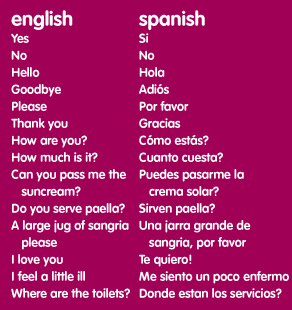Spanish Language
Delve into Barcelona’s most widely understood tongue
By Duncan Rhodes
Welcome to our beginner’s guide to Spanish. Pick up a few words and phrases of Castilian to help you on your travels…
Despite the renaissance of the Catalan language in this autonomous region of Spain (it was banned during the Franco years), for practical purposes visitors will still find Castilian Spanish much more useful for navigating their way around the city. The reason for this is that the large number of Barcelona residents hailing from Central and South America, and other Spanish-speaking foreigners, means that you will encounter a lot of people who don’t speak Catalan – but almost no one who doesn’t speak Spanish! ¿No hablas espanol? Don’t worry, that’s why we’ve compiled a quick beginner’s guide to help you breeze through some everyday situations with the aplomb of a born communicator…
Spanish (also known as Castilian, or Castellano, as it evolved in the Kingdom of Castile around the 9th century) is spoken by 329 million native speakers. This makes it the second most spoken language in the world in terms of native speakers (ahead of English, but after Chinese Mandarin).
The good news for newcomers to Spanish is that it is a relatively easy language to learn, especially if you have any experience with fellow Latin languages French or Italian. English speakers however will have to get used to nouns having one of two genders (masculine or feminine), as well as conjugating their verbs – pesky at first, but you soon get used to it.
Pronunciation shouldn’t prove too problematic but a few things to remember include the Spanish ‘v’ can sound suspiciously like a ‘b’, the ‘r’ is rolled (the stronger the better) and a double ‘l’, sounds like a ‘y’ in English.
If you decide you want to learn more, why not head to our language schools page and sign up for Spanish lessons in Barcelona?
Spanish is full of words that are similar to English and language students will be pleased to get a head start with words like importante (important), posible (possible) and posición (position) hardly taxing the budding linguist.
However the academic should be aware of some falsos amigos (false friends)! The Spanish word ‘sensible’ is best translated as sensitive, the word ‘decepción’ means disappointment and you could easily embarrass yourself by not knowing that ’embarazada’ means pregnant…


